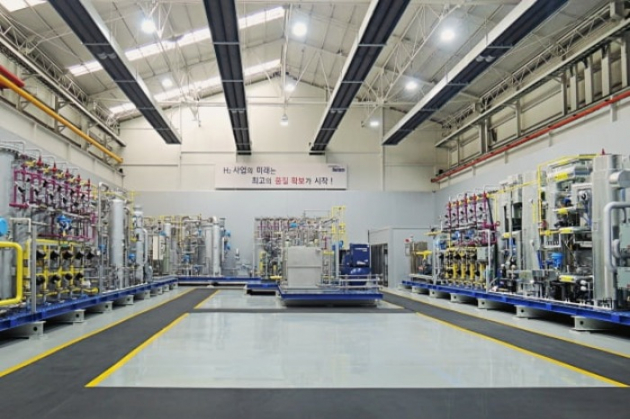Hyundai Rotem to kick off liquid hydrogen fueling station project
It marks the first time a domestic firm’s technology will be applied to a liquid hydrogen fueling station
By Apr 22, 2022 (Gmt+09:00)
LG Chem to sell water filter business to Glenwood PE for $692 million


Kyobo Life poised to buy Japan’s SBI Group-owned savings bank


KT&G eyes overseas M&A after rejecting activist fund's offer


StockX in merger talks with Naver’s online reseller Kream


Mirae Asset to be named Korea Post’s core real estate fund operator



Hyundai Rotem Co., a South Korea’s railway system maker under Hyundai Motor Group, said on Friday that it has won a demonstration project to build one liquid hydrogen fueling station in Gangwon Technopark, an industrial tech complex in Gangwon Province of Korea. The firm is aiming to bolster its hydrogen business portfolio by preoccupying the early stage of the liquid hydrogen charging market.
Liquid hydrogen is a liquid state of the element hydrogen at atmospheric pressure. The element hydrogen needs to be cooled to minus 253 degrees Celcius to be liquefied. It can shrink to 1/800 of its volume in a gaseous state, making storage and shipping easier. The key technology of the fueling station is to safely change the hydrogen’s state from liquid to gas.
Hyundai Rotem will demonstrate its in-house layout of the equipment and operating system within the fueling station. This is the first time for a domestic firm’s technology to be applied to a liquid hydrogen fueling station, a Hyundai Rotem official said.
The firm is growing hydrogen fueling infrastructure as its new business. On April 20, it signed an agreement with Korea Gas Technology Corp. to build a hydrogen production center in Wanju County of North Jeolla Province in Korea. It founded a factory in Uiwang City, Gyeonggi Province in 2020, and has produced five hydrogen extractors since then.
In January of this year, Hyundai Rotem said the facilities are set to begin mass production in February with a production capacity of 20 hydrogen extractors. Each extractor produces 640 kilograms of hydrogen a day, enough to fully charge 129 units of Nexo, Hyundai's hydrogen-powered sport utility vehicle.
Hyundai Rotem's move is in line with the Korean government's policy to prioritize building up its hydrogen distribution infrastructure. The country is aiming to increase the number of hydrogen charging stations to 660 and then over 2,000 by 2050, from the current 100.
Write to Hyung-Kyu Kim at khk@hankyung.com
Jihyun Kim edited this article.
-
 Future mobilityHyundai Motor invests in cloud, hydrogen firms for future mobility
Future mobilityHyundai Motor invests in cloud, hydrogen firms for future mobilityMar 17, 2022 (Gmt+09:00)
2 Min read -
 Corporate investmentHyosung to expand carbon fiber production for hydrogen tanks
Corporate investmentHyosung to expand carbon fiber production for hydrogen tanksMar 03, 2022 (Gmt+09:00)
1 Min read -
 Hydrogen economyHyundai Rotem to mass produce hydrogen extractors
Hydrogen economyHyundai Rotem to mass produce hydrogen extractorsJan 27, 2022 (Gmt+09:00)
2 Min read -
 Hydrogen economySamsung, Lotte, POSCO to build hydrogen plant in Malaysia
Hydrogen economySamsung, Lotte, POSCO to build hydrogen plant in MalaysiaJan 26, 2022 (Gmt+09:00)
2 Min read -
 Hydrogen economyKorea’s GS E&C to export hydrogen plant modules to US
Hydrogen economyKorea’s GS E&C to export hydrogen plant modules to USJan 25, 2022 (Gmt+09:00)
1 Min read -
 MachineryHyundai Rotem wins $296.5 mn electric train deal from Tanzania
MachineryHyundai Rotem wins $296.5 mn electric train deal from TanzaniaJul 06, 2021 (Gmt+09:00)
1 Min read


